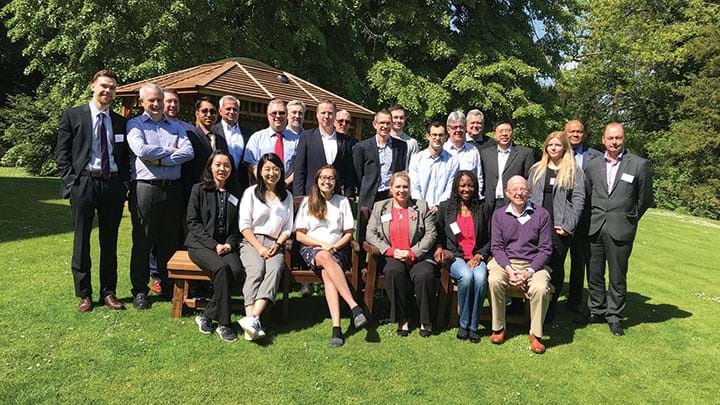Congress: Rising to the Challenge
FIVE months on since IChemE’s newly-established Congress opened its first session, providing representation for members and a mechanism to constructively challenge and debate with the Board of Trustees, Congress Chair Nigel Hirst presented the group’s first progress report at the AGM. We caught up with him on the fringes of the meeting to discuss Congress’ work to date and its immediate priorities.
First, it helps to understand how Congress operates. In short, Hirst collects suggestions for discussion topics from across membership, including members of Congress and the Trustees.
“I use executive privilege to choose three or four things which I think are important, relevant, and where we can get some sort of impact by discussing them,” he explains, along with input from the Congress steering group. He then sets an agenda for the next session, which lasts up to five weeks. This involves posting an opening statement about each topic on a closed online chat forum where Congress members add their thoughts and a conversation develops. If questions arise that require external input for example from Trustees or IChemE’s CEO, Hirst acts as the conduit and feeds back their answers to drive forward the discussion. At the end of the session, the debate is distilled and a report submitted to the Board of Trustees.
“I’ve been very impressed with the level and enthusiasm of the contributions [from Congress members]. It’s impressive to see the wide range of chemical engineers we’ve got…all putting their ideas and views down to help IChemE move forward.”
Session topics to date have included: communications between Congress and the electorate; surveying members on engagement; and providing input on the Strategy 2024 document proposed by the Board of Trustees.
At the AGM, IChemE’s President Ken Rivers said that in the short time Congress has been established it “has made some major contributions to the development of important projects, to ensure they align with member expectations”.
Hirst explains that Congress spent two weeks reviewing the draft strategy and submitted several pages of comments and suggestions. Ahead of the AGM, members of Congress and Trustees met for face-to-face discussions, and Hirst said Rivers assured the group that its feedback had helped shape the final version.
“I think Congress members were reassured that this is not just a talking shop, it has positive benefit,” Hirst said.
Looking ahead, Hirst says the group has challenges to address. Priorities include defining its role and status relative to Trustees and Country Boards, which was deliberately left to Congress. Hirst said this was a key discussion point at May’s face-to-face meeting and will continue online.
“We’re the voice of the membership so to an extent we can reshape ourselves, take Congress in whichever way we want, and no limit has been put on us by the Trustees. We’ve been given a free canvas to work on, which I think is very important.”

Next steps also include agreeing succession-planning rules, with Hirst recognising the “tremendous work” carried out by Vice-Chair Jane Cutler on how elections and re-elections to Congress should work to avoid co-termination of the volunteer body. Hirst says another key challenge, and one not isolated to Congress, is building volunteer engagement.
“I believe IChemE is probably in a better place now than it’s been in living memory in terms of its relevance, its democracy and the goodwill and technical expertise which it contains. The question is: where do we take it from here? That can only come by more people volunteering to become Congress members, to become regional group members, to become learned society members. And it’s going to require a significant increase in the number of volunteers to deliver all the things that the members have said that they want. It won’t happen by leaving it to the people who work in Rugby. The members have got to get engaged; have got to help deliver it themselves. By all means pass your questions to Congress but get involved.”
To read Congress’ progress report, visit: https://bit.ly/2JWRyQz
To interact with Congress members directly, visit: https://www.icheme.org/about-us/people/congress/
Recent Editions
Catch up on the latest news, views and jobs from The Chemical Engineer. Below are the four latest issues. View a wider selection of the archive from within the Magazine section of this site.




